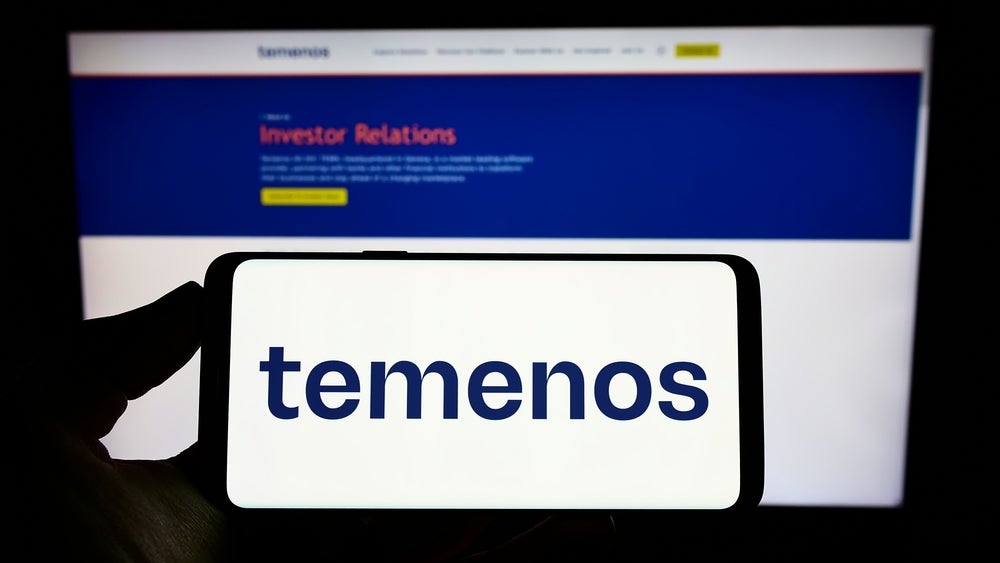The issue of authenticating account holder identities is
one that is becoming increasingly important, and one company,
Unified Software, is aiming to take on the major players with its
proprietary solution. CI met with the company recently to
discuss its growth plans and major objectives going
forward.
 Unified Software might not
Unified Software might not
be a name with recognition on the scale of competitors like
Experian, but the UK-based provider of financial web services is
quickly making a name for itself in the authentication solution
space.
Having only been established in
2003, the company, which specialises in providing web services
technology for data cleansing and validation for online monetary
transactions, now has nearly 400 customers worldwide.
The cornerstone of its offerings is
the BankVal SaaS (software as a service) solution, which validates
sort codes and account numbers in order to authenticate potential
and existing customers of a range of organisations. Unified
Software’s solution covers BACS credits, direct debits, CHAPS
payments, and transactions via the faster payments system.
George Barron, managing director,
and Ross Miller, sales and marketing director, recently met with
CI to outline the company’s objectives and the growing
importance of SaaS applications in the banking and payments
world.
How well do you really know your competitors?
Access the most comprehensive Company Profiles on the market, powered by GlobalData. Save hours of research. Gain competitive edge.

Thank you!
Your download email will arrive shortly
Not ready to buy yet? Download a free sample
We are confident about the unique quality of our Company Profiles. However, we want you to make the most beneficial decision for your business, so we offer a free sample that you can download by submitting the below form
By GlobalData“There’s an ongoing requirement for
validation of banking information,” Barron told CI.
“Traditionally in stored software there’s a flaw in that the data
behind the scenes that you need to validate against is dynamic. As
a freelance developer some years ago, I kept coming across this
problem.
“On one particular project I worked
on way back in 2002, web services technology and SaaS was starting
to emerge. I thought it was an ideal opportunity to develop a
validation solution that would be maintenance-free.
“I put together a prototype of a
SaaS validation application, and delivered it to the client. The
client (Newcastle University) saw how it could save them a lot of
time and money.
“They said to me if I could develop
it into a professional product they would buy it from me, so that’s
what I did. By word of mouth, I secured a succession of customers
in that space, and it made me realise that I had a very viable
product.”
Explaining how important such
validation solutions are, Miller said: “When you’re setting up
direct debits or collections, you’ve got to make sure you’ve got
the right details because of the hassle factor. If you get it
wrong, you get a rejection from BACS [the UK payment
processor].
“Typically, what people do is they
do a payments or collection run at the end of the month. If it goes
wrong then you get a file back from BACS saying that there are
problems. It then becomes a manual process, so you’re adding time
and cost.”
Importance of dynamic data
validation
Unified Software’s solution
improves on competing solutions in the marketplace by being
maintenance-free for customers, as Barron explains.
“The data validation rules behind
any validation system are very dynamic. We maintain those rules and
that data centrally, so it automatically provides up-to-date
validation for customers, whereas our competition at the start was
purely installed software where somebody has to take delivery of
the installation CD once a month, install all the updates, reboot
the system, and whatever else they need to do,” he says.
Such a manual process is incredibly
cumbersome for customers, given the multitude of variables that
impact on the data collection process.
“In the UK all the data comes from
VocaLink [the UK transaction service provider],” Miller told
CI. “They have a database of all the bank account details
and sort codes. In the background, bank branches are closing and
moving and changing, so we get issued with new data every week.
“Our service is actually updating
continuously in the background, whereas if you bought a traditional
software package from the likes of Experian, they would be sending
you a disk every month or every quarter to update that data, and
then you as the user has to upload that data and change your
database.”
Barron added: “The other side of it
is that us supplying updates as and when we get them means the
software is more accurate more of the time. If you had a
conventional piece of software, given the frequency of updates to
the data cycle, the quality of your data is only going to degrade
until you manually bring it back up to speed, whereas we do that
all the time in the background. You have more accurate results all
of the time.”
Pay-as-you-go business
model
 Another distinct advantage
Another distinct advantage
that Unified Software has over its competitors is its business
model. Whereas most companies in this space offer software packages
sold at a fixed price, typically worth thousands of pounds, Unified
Software offers its solution on a pay-per-use model, which costs
significantly less for its customers.
“Traditionally, if you’re an SME,
you wouldn’t have gone to the expense of buying in a software
package, so what we’ve done is create a whole new market because
you can, for pence, validate data through us, whereas you’d be
talking thousands of pounds through other providers,” Miller told
CI. “The whole idea about SaaS is you pay for what you use
and it’s very cost-effective, and that’s where we’re creating our
new market here.
“From what we know, a typical
competitor for a single user package is charging around £5,000
[$7,471] plus typically 20% maintenance per annum on that. So
there’s an outlay there in the first year of £6,000 and then it’s
ongoing. What they’re doing is a 3-year fixed licence and then
renewing it.”
He continued: “Our typical customer
is paying less than £50 a month, so it’s less than 10% and in some
cases, when you get down to people validating 50 to 100 accounts
per month, you’re talking around 5% of the cost. Those customers
wouldn’t have been able to do this before, and they would have got
this issue of having a mistake and having to do the manual
process.
Barron explained that the solution
is particularly popular with clients who see a fluctuation for
demand throughout the year, such as the higher education sector
where there is typically a spike in demand in September and October
when students are applying for courses.
“They like the model we have
because they’re only paying for exactly what they use. They don’t
need a system in place all the time at great expense. They just
need the service there when they want it, which means they’re
working as efficiently as they possibly can,” he said.
In a relatively short space of
time, Unified Software has secured a wide range of customers, both
in the UK and internationally.
“We’ve got multi-sector clients but
across a broad cross-section of customers, comprising large
corporates with global accounts. But, when you look at the spread,
a lot of our customers are coming out of new marketplaces, which
are in the SME space,” Miller told CI.
“We’ve got nearly 400 customers
worldwide, large ones like JPMorgan Chase, who use the
international data from us, and we’ve got BT, BP and we’ve also got
public sector accounts, such as local authorities and a couple of
central government bodies.
“It’s not defined in any particular
vertical. It applies to all companies. At the end of the day
practically everyone uses direct debits for collections and
payments, so it’s where these organisations are using it, and they
need validation.”
Growing international
interest
Alongside strong demand from
customers in the UK, Unified Software is also seeing an upturn in
interest coming from international markets, as Miller
explained.
“We get on average probably about
30 plus enquiries a week. On our website we run free trials, and on
our international service we have about 15 to 20 enquires a week.
If you go back a year, international enquiries were between 5 to 10
a week,” he says.
“So we are seeing this demand
coming through on the international front. We are seeing more
Central and Eastern European companies coming to us because what
we’ve had is UK-based global companies. We’re now picking up
organisations from around the world who are searching out this kind
of service.”
The current economic environment
has also provided something of a boost in demand for the company’s
services.
“We see that the recession has
caused companies to look at how they can cut costs,” Miller said.
“Some of our larger customers that we have have moved away from
packaged services in favour of our model because it’s very
cost-effective. New entrants into the market for us are those who
say that they need to do this, but why should they buy a software
package when they can use this model?
“We’ve got a very large supermarket
chain which has adopted our solution. They came to us because our
business model was right for them, and they were intrigued. They
said: ‘Even at the pricing that you’re offering, it’s still very
competitive and cost-effective for us to go on a pay-per-use model,
rather than install a very large software package.’”
Barron added: “For SEPA which is
being rolled out now, we have another validation service and SaaS
application that validates international bank account numbers and
bank identifier codes and so on, and we’re finding that there’s an
increased uptake in that. As people are putting together solutions
for SEPA payments, some of the big players such as JPMorgan Chase
are already developing products in this space.
“We’re finding we’re getting more
interest from other corporates directly who know they’re going to
have to put this stuff in place, companies like SAP who need
validation in place for their SEPA transactions to work, so we’ve
seen another kind of thread of interest developing there.”
Miller explained: “Because of the
SEPA market being created, it’s going to reduce costs for
organisations. They can make payments directly themselves, but
there’s a penalty for getting it wrong. Our solution to that stops
that happening, so it’s very cost-effective for them. We’re seeing
a strong demand coming through now for international-based
products. I think people are switching on to the fact that they no
longer have to pay their bank to make payments for them, and that
they can do this themselves within the EU.
“The other thing, from a business
perspective, is that recessions have this effect on companies to
look for cost reductions. This is ideal for us because companies
are asking why they are paying out so much money to pay suppliers,
when they could be doing it themselves.
“What they need is a payment
provider who can ensure that they can validate payment data. It is
driving this market for us. Although we’re at the beginning of
this, we can see that it is beginning to grow, and as it catches
on, the EU will be absolutely brilliant for us.
“We are starting to translate our
website into other languages. We’ve also had a few enquires from
China, because you have a lot of Chinese manufacturers and payments
are becoming increasingly important, so we’re now considering
translating our services into Chinese. There will be a strong
demand from there.”
Moving forward, Unified Software
will be looking at other validation services, such as
know-your-customer (KYC) services, which Barron said is also a
growing need for its client base.
“We’ve had a product for address
validation where we’ve put bank details and address details
together,” Miller says.
“One of our supermarket clients is
setting up direct debits for a service they’re offering. So they
have got telesales operatives who are talking to potential
customers and asking to validate their personal details and address
details, and we will be adding additional checks into that going
forward.
“KYC is a big thing, and we haven’t found anyone else whose
doing something similar as a packaged service, and we see that as a
good thing that we’ll be looking at.”







